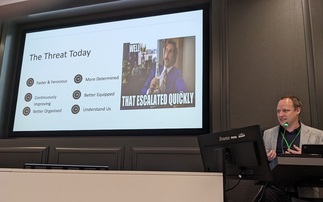30 per cent of employees have never had any cyber security training, and many follow unsafe practices
The majority of employees follow poor cyber-security practices when working remotely, with many sharing passwords and connecting to public WiFi. Nearly a third of UK households with a computer have...
To continue reading this article...
Join Computing
- Unlimited access to real-time news, analysis and opinion from the technology industry
- Receive important and breaking news in our daily newsletter
- Be the first to hear about our events and awards programmes
- Join live member only interviews with IT leaders at the ‘IT Lounge’; your chance to ask your burning tech questions and have them answered
- Access to the Computing Delta hub providing market intelligence and research
- Receive our members-only newsletter with exclusive opinion pieces from senior IT Leaders






















